
 |
|
|
|
There are great movies of all kinds. One very special variety gives us the feeling of having tapped into a bit of 'life as it is lived.' A masterful example is Jean Renoir's 1951 The River, an unusual picture in every way. A true artist, Renoir built up such a reputation in the 1930s that he survived the unpopular The Rules of the Game yet was still welcomed in Hollywood. There he found the factory working conditions inimical to his style, with ultimate artistic control in the hands of the studio and its producers. Yet he made fine movies in America (Swamp Water, The Southerner, This Land is Mine) and for various reasons elected to stay there after the war, with the idea that things would get better. Instead he made The Woman on the Beach at RKO, a film that was taken from him and drastically altered. Did the film business no longer have room for a director-author? 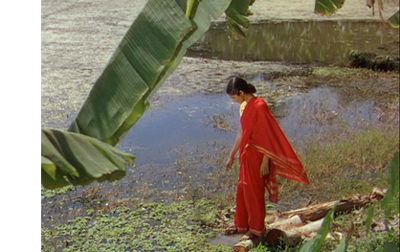
Rescue came in the person of an ambitious Hollywood florist (!) with a bank account big enough to fund a Technicolor movie. The book he wanted to film was The River by Rumer Godden, an Englishwoman who grew up in India. It was a perfect collision of coincidences. Jean Renoir already held the book under option. The would-be producer proposed that they make it together. Renoir got along well with Ms. Godden, and they joined forces to adapt the book together. She liked this much more than her experience with her other book Black Narcissus, a film of which had just been made by Michael Powell and Emeric Pressburger. Renoir imagined The River as a tour-de-force comeback to show that he could beat Hollywood at its own game. He filmed it in English, and reportedly aimed it primarily at the American market. The River couldn't be more different than what was being released by Hollywood. The film does not reflect the cataclysmic political upheavals underway in that country. We assume that the time frame is contemporary, right after the war, but there are precious few clues that that war has to be WW2. Along a river are a few English houses. The foreigners maintain their English identity but take part in some of the local customs and holidays as observers. 'Father' (Esmond Knight) is missing an eye; he supervises work at a jute mill. 'Mother' (Nora Swinburne) has given him three daughters and a son and is expecting another child. The son Bogey (Richard R. Foster) plays with a neighbor boy, an Indian. Nursemaid Nan (Suprova Mukerjee) cares for the children but is also their fond companion. The oldest girl Harriet (Patricia Walters) still keeps her special hideaway closet, but is beginning to take a big interest in romance. Her closest friend is Valerie (Adrienne Corri), a striking redheaded teenager, the daughter of an unseen wealthy neighbor. The focus of interest is on the house next door. Widower Mr. John (Arthur Shields) welcomes his daughter Melanie (Radha) back from college. Her mother was Indian, and although she elects to wear a traditional sari, Melanie is not sure where her future lies. The catalyst in the situation is the arrival of a relative of Mr. John, American Captain John (Thomas E. Breen). The three young women react differently to the handsome man. Harriet imagines a great romance but is childish in her approach. Valerie teases Captain John and tries to maximize her attractiveness. Melanie is likewise attracted but is far more reserved. She's the only one who intuits why the Captain has traveled halfway around the world: he lost a leg in the war, and hasn't yet made a social adjustment to it. 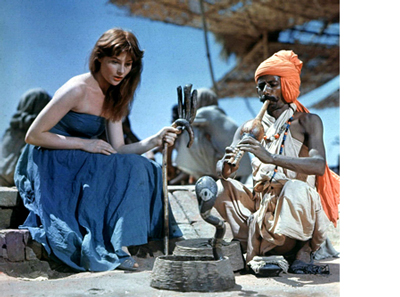
That's the whole 'story' of The River -- the bulk of the film is a small-scale Little Women. Harriet keeps a diary (she's the eventual 'author' of what we're watching) and frets over her romantic future. The beautiful Valerie wants to test her ability to wrap a man around her finger. The watchful, ever-cautious Melanie is partly an outsider, but proves that she's by far the most sensitive to the Captain's problems. Yet we never feel the lack of bigger conflicts. The storyline eventually takes in growing up, pain and happiness, birth and death. It's a beautiful film, just to look at. Presentation is everything with The River. A narration appears over shots of the river, the countryside and work being done at the jute mill, but none of this material becomes a travelogue or an educational film about customs. Many things are presented without a full explanation, starting with an ornate white pattern painted on a dirt floor to welcome visitors. The acting ranges from amateurish (the smaller children) to earnest (Patricia Walters) to adept (familiar John Ford actor Arthur Shields, polished Englishwoman Adrienned Corri, mellow mother Nora Swinburne). Unfamiliar Thomas E. Breen was a substitute for a better-known actor who bowed out at the last minute. Breen looks as if he could be Lon McAllister's older brother, but seems fully natural in only a few scenes. At first we think he's doing a bad job faking the false leg, but after a while we accept what he's doing. Breen's Captain is struggling with his handicap, but there are no scenes of overwrought dramatics. He simply loses his temper once or twice, as the girls are too dense to think twice before asking him to dance or play catch. The tone and aims of The River make the lack of consistency in the performances irrelevant. This is neither a documentary nor a polished drama, but its feeling of human honesty transcends both of those labels. 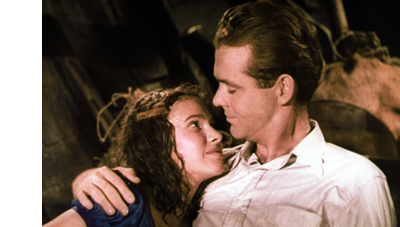
The River does without lectures or a 'guru' character telling us that we're being enlightened. We instead go with the flow of lazy days, or watch locals work and play. The family has a party on a holiday that involves lighting hundreds of candles. Little Bogie goes native and creeps through the undergrowth with his friend. This brings about the film's only feeling of outright jeopardy, as there are always poisonous cobras about. We accept the film's rhythms and reasons the same way we accept that the English family feels secure from harm in this strange country. What we get are a lot of people at odds with their situations -- growing up, finding a proper place in the world. Mother tries to explain the wonder of childbirth to Harriet. When death visits, it is also accepted as a part of life. The social setup is slightly odd, as these English households employ Indian servants. Yet we never feel that anyone is being exploited, even when the Captain waves away a servant cooling him with a fan. Godden and Renoir add a mixed-race theme, which in a socially conscious Hollywood film would be 'the big issue' and constantly reinforced. Yet The River does not feel the need to sermonize, or resolve anything. Mr. John adores his mixed-race daughter Melanie. They accept the reality that her parentage will be an obstacle to marriage into an Indian family, yet Melanie decides to adopt Indian customs. 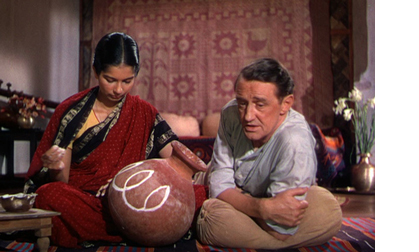
Meanwhile, we're expecting pat resolutions to the romantic angle, some variation on Happily Ever After. Even though Valerie is able to coax a kiss from Captain John, he remains slightly remote and absorbed by his personal issues. Melanie has the insight to directly confront him with his refusal to accept reality. It's a case of one-way generosity. Melanie is sensitive and caring. The Captain is polite and thoughtful, but too preoccupied with his own problems to think about hers. The most intriguing episode breaks from format to illustrate a story Harriet has written in her diary. In it she tells of the life of an Indian girl. She's born, grows to young adulthood (where she is played by Radha, the same Indian actress that plays Melanie). She falls in love with a boy that she only glimpses once, without speaking to him. Forced to marry her father's choice of husband, she's carried to the ceremony as if to an execution... Harriet's story includes a fanciful transformation of people into gods, followed by an impressive dance. Renoir chose Radha after seeing her perform as a dancer. The beautiful sequence is presented as simply as everything else in the film. We aren't lectured with a speech about the relationship between humans and deities in India, but anyone in a happy domestic partnership will understand when the girl and her groom become fantastic gods. Figuratively, marriage + dance = sex, and love completes the feeling of magical transformation. 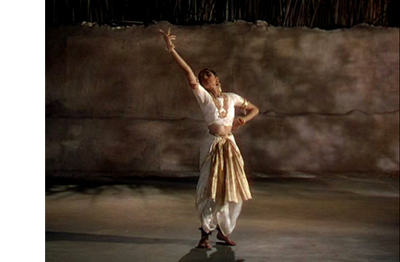
Renoir's imagery expresses its closeness to the things of nature, but it establishes its 'flow of life' without resort to poetic speeches or images loaded with special meaning. The river is pretty, but we aren't asked to accept it as a spiritual being, even as we see those that do. Renoir is too wise to try to convert us to another philosophy, but simply makes the humanist statement that all of us would benefit by keeping an open mind to other cultures. The River is a deceptively simple movie of great sophistication. Renoir is not normally associated with great technical challenges, but making a Technicolor film on the other side of the world at this time was surely a logistical feat in itself. We're told that he was an enormously patient man. The quality of the cultural cutaway material is enhanced by the fact that a camera blimp didn't arrive on the set for weeks, forcing him to shoot only MOS scenes. Thus, even a shot of some men carrying bales off a boat is a thing of serene beauty. Seeing the scenery and people in this context makes India seem closer, not more alien. The Criterion Collection's Blu-ray of The River is taken from a marvelous full film restoration from 2004, that premiered on the older DVD. The presentation is a big improvement over prints that circulated in the days of laserdiscs and VHS. The colors are revelatory. Renoir, cinematographer Claude Renoir and art director Eugène Lourié don't try to blow us away with psychedelic hues, as seems to be the goal in recent pictures eager to impress us with 'exoticism,' like the cutesy-condescending The Darjeeling Limited and the retirement fantasy The Best Exotic Marigold Hotel. Radha's impressive dance is done in only a couple of angles, and her dance costume is not so arresting as to distract from her movements. On the other hand, we are told that Renoir touched up some of the grass in the film, Vincente Minnelli- style. 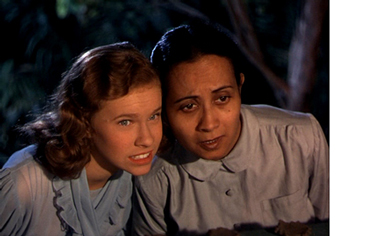
The extras go beyond what appeared on the older Criterion DVD. Renoir's B&W TV introduction, Martin Scorsese's introduction, a trailer and Ian Christie's informed essay are repeats, as is a 2000 audio interview with the florist-producer Ken McEldowney. A 1995 BBC docu about Rumer Godden revisiting India has been dropped, something that might prompt owners of the older disc to hang on to them. But a new addition is the excellent long-form docu Around the River (2008), which tells the entire story of the film's unlikely production. The docu takes a close look at the business relationship of Renoir and producer McEldowney. He supported Renoir well through the difficult shooting, but when the film became a hit reportedly opted not to distribute profits as agreed. Also new are a video essay by Paul Ryan and some interesting notes on the movie by Jean Renoir himself. The River is less about Indians than it is English expatriates. Yet it may be the only film classic set in India that stresses the ordinary things of life, as opposed to tiger hunts, colonial battles or 'alien' customs in a presumed sensual environment. It's one of the great humanist films. 
On a scale of Excellent, Good, Fair, and Poor,

The version of this review on the Savant main site has additional images, footnotes and credits information, and may be updated and annotated with reader input and graphics.
Review Staff | About DVD Talk | Newsletter Subscribe | Join DVD Talk Forum |
| ||||||||||||||||||